
awesome-ml-gen-ai-elixir
A curated list of Machine Learning libraries and resources for the Elixir programming language.
Stars: 89
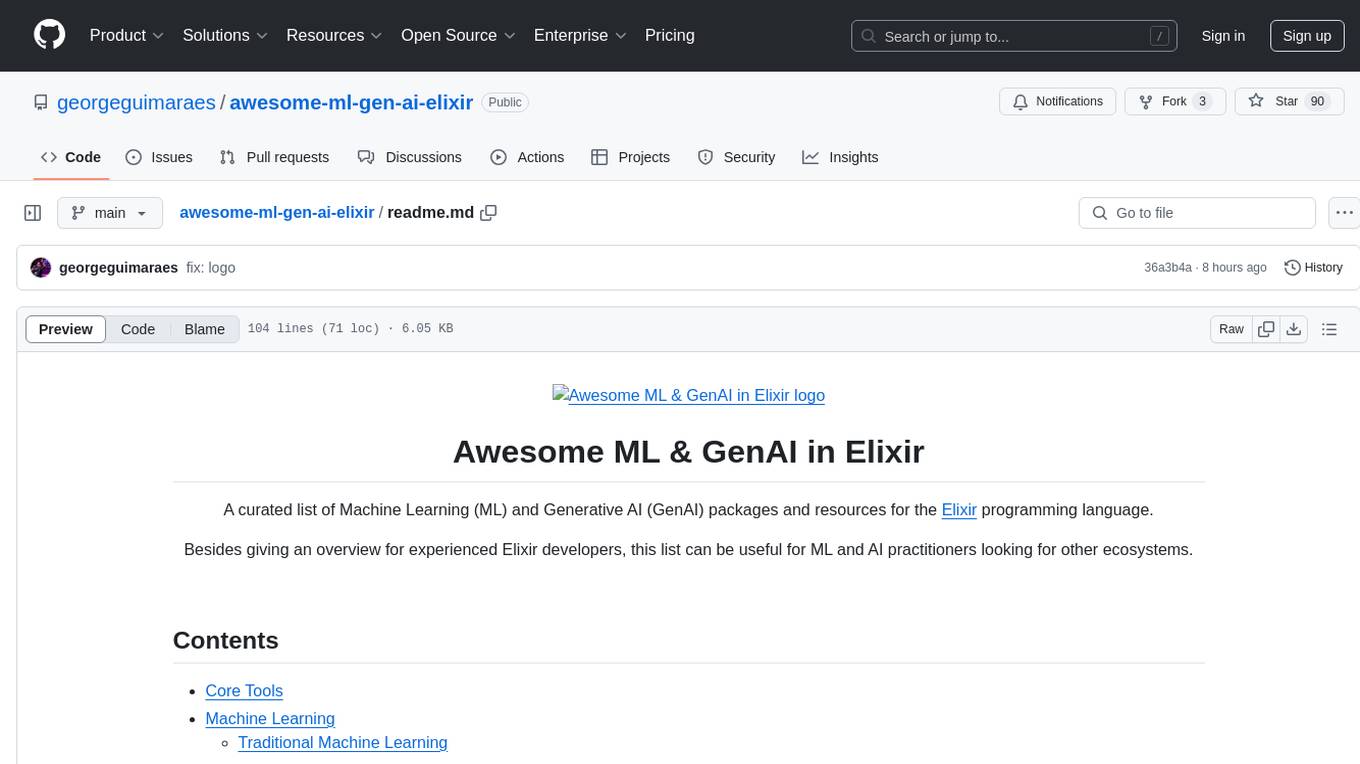
A curated list of Machine Learning (ML) and Generative AI (GenAI) packages and resources for the Elixir programming language. It includes core tools for data exploration, traditional machine learning algorithms, deep learning models, computer vision libraries, generative AI tools, livebooks for interactive notebooks, and various resources such as books, videos, and articles. The repository aims to provide a comprehensive overview for experienced Elixir developers and ML/AI practitioners exploring different ecosystems.
README:
A curated list of Machine Learning (ML) and Generative AI (GenAI) packages and resources for the Elixir programming language.
Besides giving an overview for experienced Elixir developers, this list can be useful for ML and AI practitioners looking for other ecosystems.
- Nx - Tensors for Elixir with compilation to CPU/GPU. It is the base for a lot of other libraries.
- Explorer - Series and dataframes for data exploration in Elixir.
- Livebook - Write interactive and collaborative notebooks, with integrations to databases, messaging, visualization and more.
- Kino - Render rich and interactive output. Used in Livebook.
-
Scholar - Traditional machine learning tools built on top of Nx. Implements algorithms for:
- Classification
- Regression
- Clustering
- Dimensionality reduction
- Metrics and preprocessing
- EXGBoost - Decision Trees implemented using the XGBoost C API.
- Mockinjay - Implementation of Microsoft's Hummingbird library for converting trained Decision Tree models into Nx tensor computations.
- Soothsayer - Time series forecasting library inspired by Facebook's Prophet and NeuralProphet.
- Ulam - Elixir interface to Stan, a probabilist programming language.
- Axon - Neural Networks for Elixir. Built with Nx.
- Bumblebee - Pre-trained neural network models on top of Axon. Provides integration with Hugging Face.
- Ortex - Wrapper around ONNX. Enables you to run ONNX models using Nx.
- Honeycomb - Fast LLM inference built on Elixir, Bumblebee, and EXLA.
- Instructor.ex - Structured outputs from LLMs using Ecto schemas. Works with OpenAI, llama.cpp and Bumblebee.
- Jido - Framework for building autonomous, distributed agent systems using traditional AI and ML approaches.
- LangChain - Framework for developing applications powered by language models, with support for OpenAI, Anthropic, Google, and Bumblebee models.
- José Valim's Livebooks - Livebooks that José used for talks and Advent of Code.
- Programming Machine Learning - Livebook notebooks with code examples for the Programming Machine Learning book by Paolo Perrotta
- Machine Learning in Elixir - Livebooks following along with the book Machine Learning in Elixir by Sean Moriarity
- Asynchronous Processing in Elixir - Interactive guide using Livebook to asynchronous data processing in Elixir.
- Machine Learning in Elixir - Learning to Learn with Nx and Axon (by Sean Moriarity)
- Genetic Algorithms in Elixir - Solve Problems Using Evolution (by Sean Moriarity)
- (2023) A year in production with Machine Learning on the BEAM (Explorer, Scholar, Bumblebee, Livebook)
- (2023) Nx-powered decision trees (Nx, EXGBoost)
- (2023) Building AI apps with Elixir
- (2023) MLOps in Elixir: Simplifying traditional MLOps with Elixir (Nx, Bumbleblee)
- (2023) Fine-tuning language models with Axon (Axon)
- (2023) Data wrangling with Livebook and Explorer (Livebook, Explorer)
- (2022) The Future AI Stack by Chris Grainer (Explorer, Axon)
- (2022) Announcing Bumblebee: pre-trained machine learning models for GPT2, StableDiffusion, and more (Livebook, Bumblebee)
- (2022) Axon: functional programming for deep learning (Axon)
- (2023) From Python to Elixir Machine Learning - Nice wrapup on what you gain from the Elixir ecosystem for Machine Learning.
Contributions welcome! Read the contribution guidelines first.
This project is licensed under the CC0 License. Feel free to use, share, and adapt the content.
For Tasks:
Click tags to check more tools for each tasksFor Jobs:
Alternative AI tools for awesome-ml-gen-ai-elixir
Similar Open Source Tools

awesome-ml-gen-ai-elixir
A curated list of Machine Learning (ML) and Generative AI (GenAI) packages and resources for the Elixir programming language. It includes core tools for data exploration, traditional machine learning algorithms, deep learning models, computer vision libraries, generative AI tools, livebooks for interactive notebooks, and various resources such as books, videos, and articles. The repository aims to provide a comprehensive overview for experienced Elixir developers and ML/AI practitioners exploring different ecosystems.
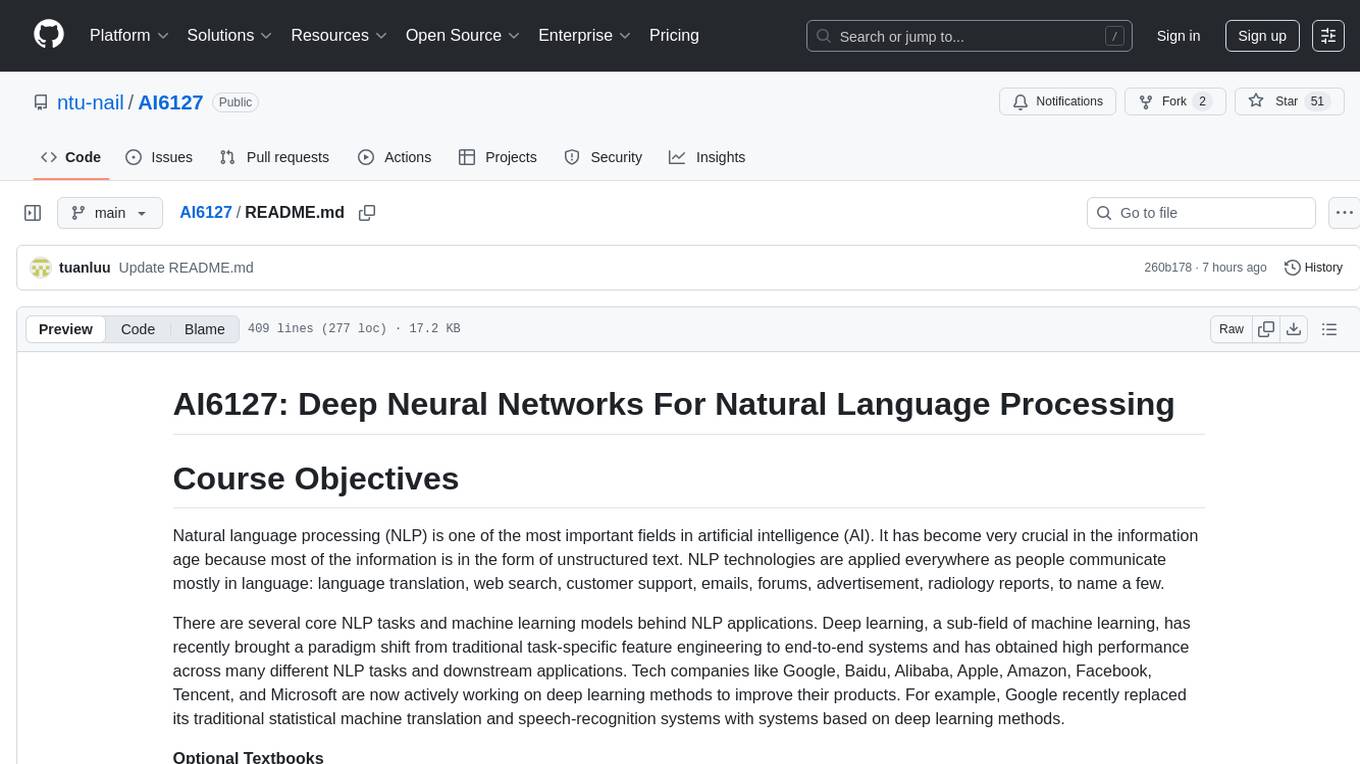
AI6127
AI6127 is a course focusing on deep neural networks for natural language processing (NLP). It covers core NLP tasks and machine learning models, emphasizing deep learning methods using libraries like Pytorch. The course aims to teach students state-of-the-art techniques for practical NLP problems, including writing, debugging, and training deep neural models. It also explores advancements in NLP such as Transformers and ChatGPT.

nlp-llms-resources
The 'nlp-llms-resources' repository is a comprehensive resource list for Natural Language Processing (NLP) and Large Language Models (LLMs). It covers a wide range of topics including traditional NLP datasets, data acquisition, libraries for NLP, neural networks, sentiment analysis, optical character recognition, information extraction, semantics, topic modeling, multilingual NLP, domain-specific LLMs, vector databases, ethics, costing, books, courses, surveys, aggregators, newsletters, papers, conferences, and societies. The repository provides valuable information and resources for individuals interested in NLP and LLMs.
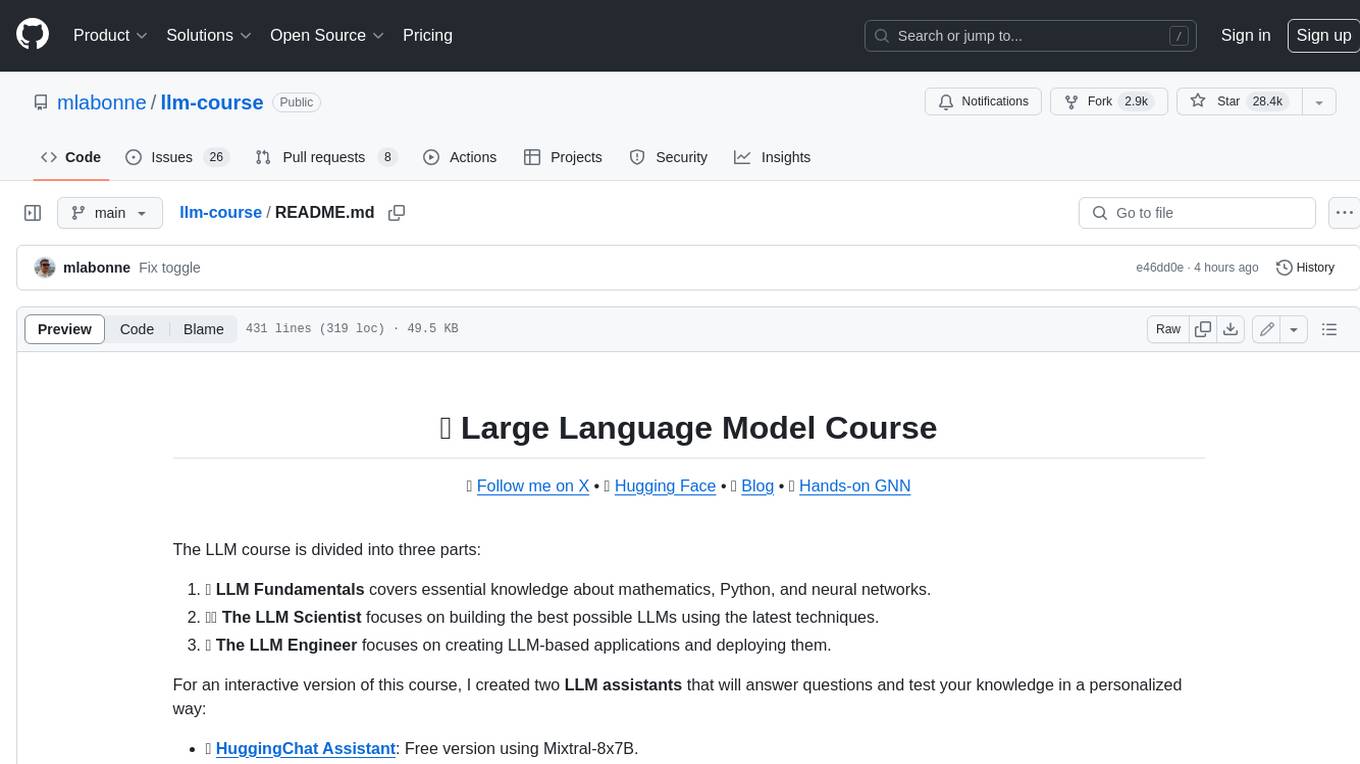
llm-course
The LLM course is divided into three parts: 1. 🧩 **LLM Fundamentals** covers essential knowledge about mathematics, Python, and neural networks. 2. 🧑🔬 **The LLM Scientist** focuses on building the best possible LLMs using the latest techniques. 3. 👷 **The LLM Engineer** focuses on creating LLM-based applications and deploying them. For an interactive version of this course, I created two **LLM assistants** that will answer questions and test your knowledge in a personalized way: * 🤗 **HuggingChat Assistant**: Free version using Mixtral-8x7B. * 🤖 **ChatGPT Assistant**: Requires a premium account. ## 📝 Notebooks A list of notebooks and articles related to large language models. ### Tools | Notebook | Description | Notebook | |----------|-------------|----------| | 🧐 LLM AutoEval | Automatically evaluate your LLMs using RunPod |  | | 🥱 LazyMergekit | Easily merge models using MergeKit in one click. |  | | 🦎 LazyAxolotl | Fine-tune models in the cloud using Axolotl in one click. |  | | ⚡ AutoQuant | Quantize LLMs in GGUF, GPTQ, EXL2, AWQ, and HQQ formats in one click. |  | | 🌳 Model Family Tree | Visualize the family tree of merged models. |  | | 🚀 ZeroSpace | Automatically create a Gradio chat interface using a free ZeroGPU. |  |
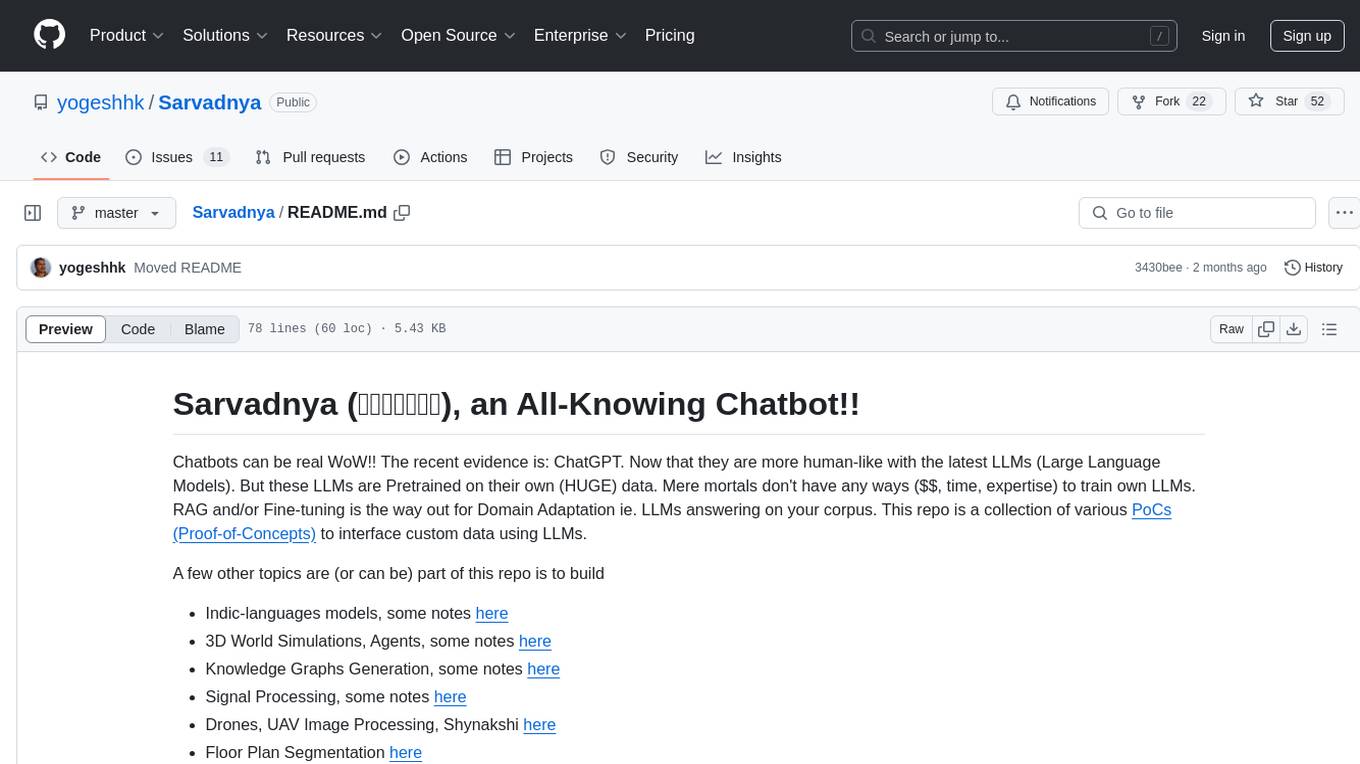
Sarvadnya
Sarvadnya is a repository focused on interfacing custom data using Large Language Models (LLMs) through Proof-of-Concepts (PoCs) like Retrieval Augmented Generation (RAG) and Fine-Tuning. It aims to enable domain adaptation for LLMs to answer on user-specific corpora. The repository also covers topics such as Indic-languages models, 3D World Simulations, Knowledge Graphs Generation, Signal Processing, Drones, UAV Image Processing, and Floor Plan Segmentation. It provides insights into building chatbots of various modalities, preparing videos, and creating content for different platforms like Medium, LinkedIn, and YouTube. The tech stacks involved range from enterprise solutions like Google Doc AI and Microsoft Azure Language AI Services to open-source tools like Langchain and HuggingFace.
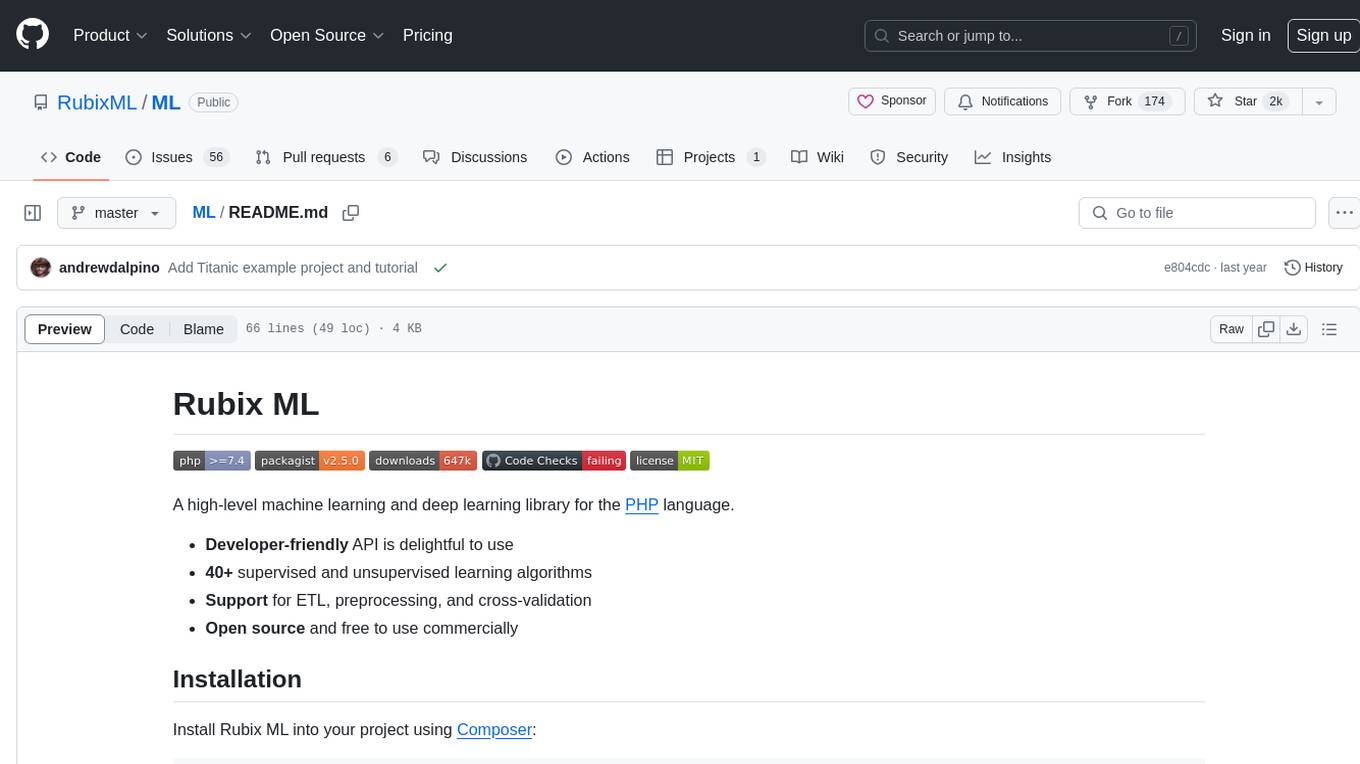
ML
Rubix ML is a high-level machine learning and deep learning library for the PHP language. It provides a developer-friendly API with over 40 supervised and unsupervised learning algorithms, support for ETL, preprocessing, and cross-validation. The library is open source and free to use commercially. Rubix ML allows users to build machine learning programs in PHP, covering the entire machine learning life cycle from data processing to training and production. It also offers tutorials and educational content to help users get started with machine learning projects.
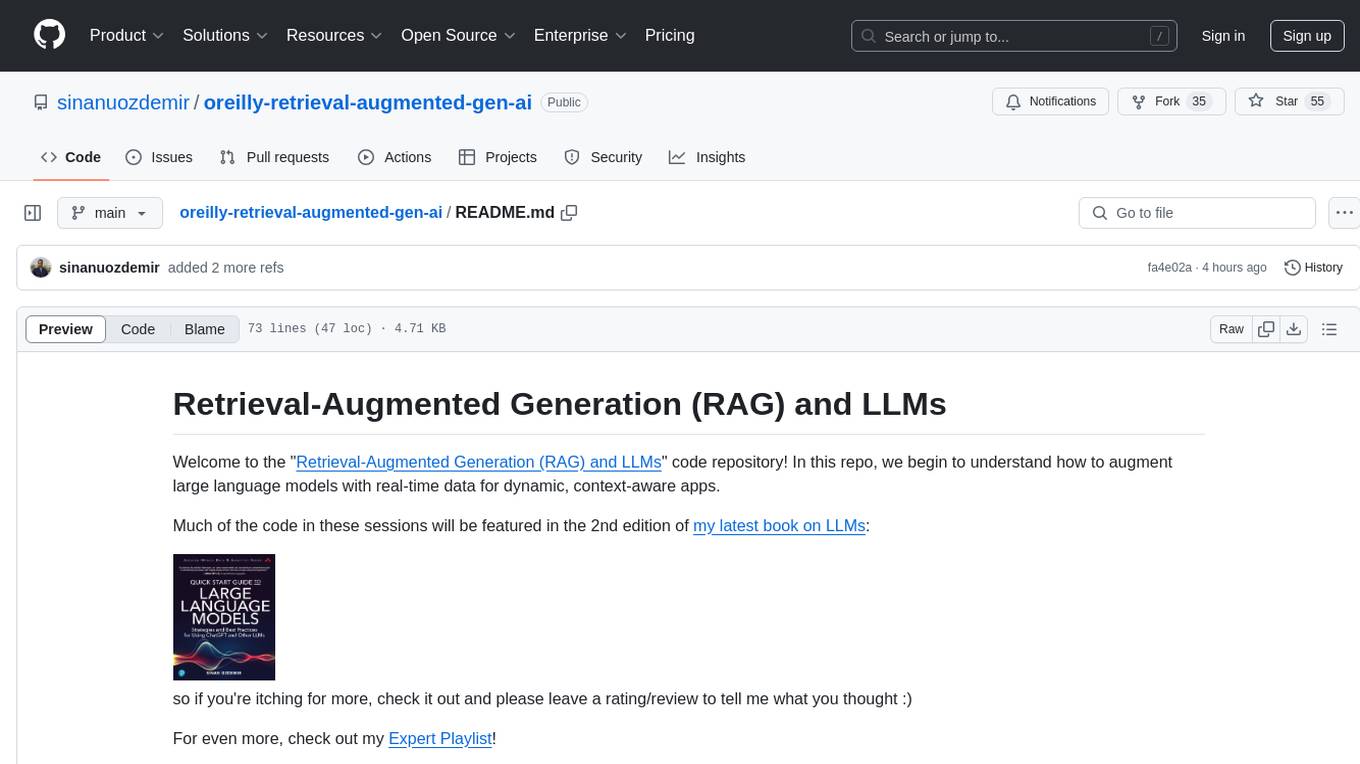
oreilly-retrieval-augmented-gen-ai
This repository focuses on Retrieval-Augmented Generation (RAG) and Large Language Models (LLMs). It provides code and resources to augment LLMs with real-time data for dynamic, context-aware applications. The content covers topics such as semantic search, fine-tuning embeddings, building RAG chatbots, evaluating LLMs, and using knowledge graphs in RAG. Prerequisites include Python skills, knowledge of machine learning and LLMs, and introductory experience with NLP and AI models.
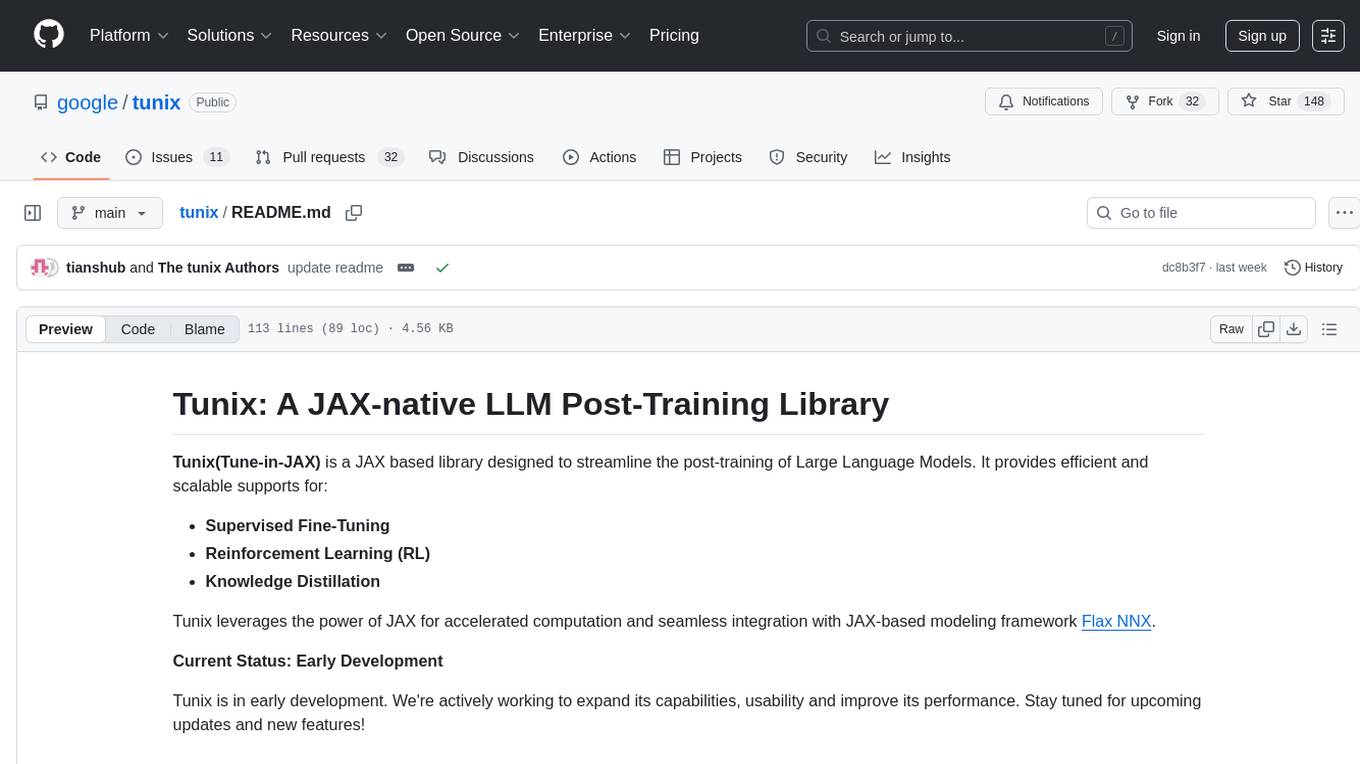
tunix
Tunix is a JAX-based library designed for post-training Large Language Models. It provides efficient support for supervised fine-tuning, reinforcement learning, and knowledge distillation. Tunix leverages JAX for accelerated computation and integrates seamlessly with the Flax NNX modeling framework. The library is modular, efficient, and designed for distributed training on accelerators like TPUs. Currently in early development, Tunix aims to expand its capabilities, usability, and performance.
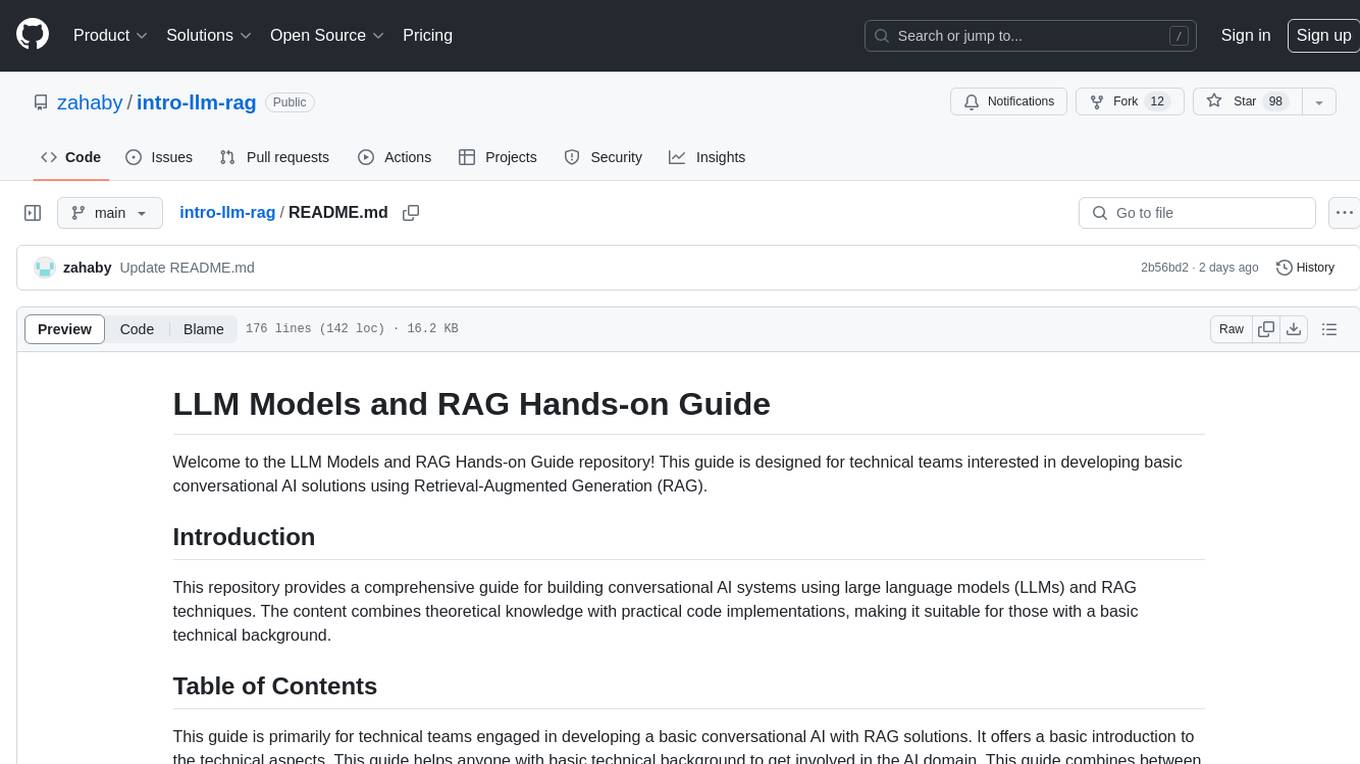
intro-llm-rag
This repository serves as a comprehensive guide for technical teams interested in developing conversational AI solutions using Retrieval-Augmented Generation (RAG) techniques. It covers theoretical knowledge and practical code implementations, making it suitable for individuals with a basic technical background. The content includes information on large language models (LLMs), transformers, prompt engineering, embeddings, vector stores, and various other key concepts related to conversational AI. The repository also provides hands-on examples for two different use cases, along with implementation details and performance analysis.
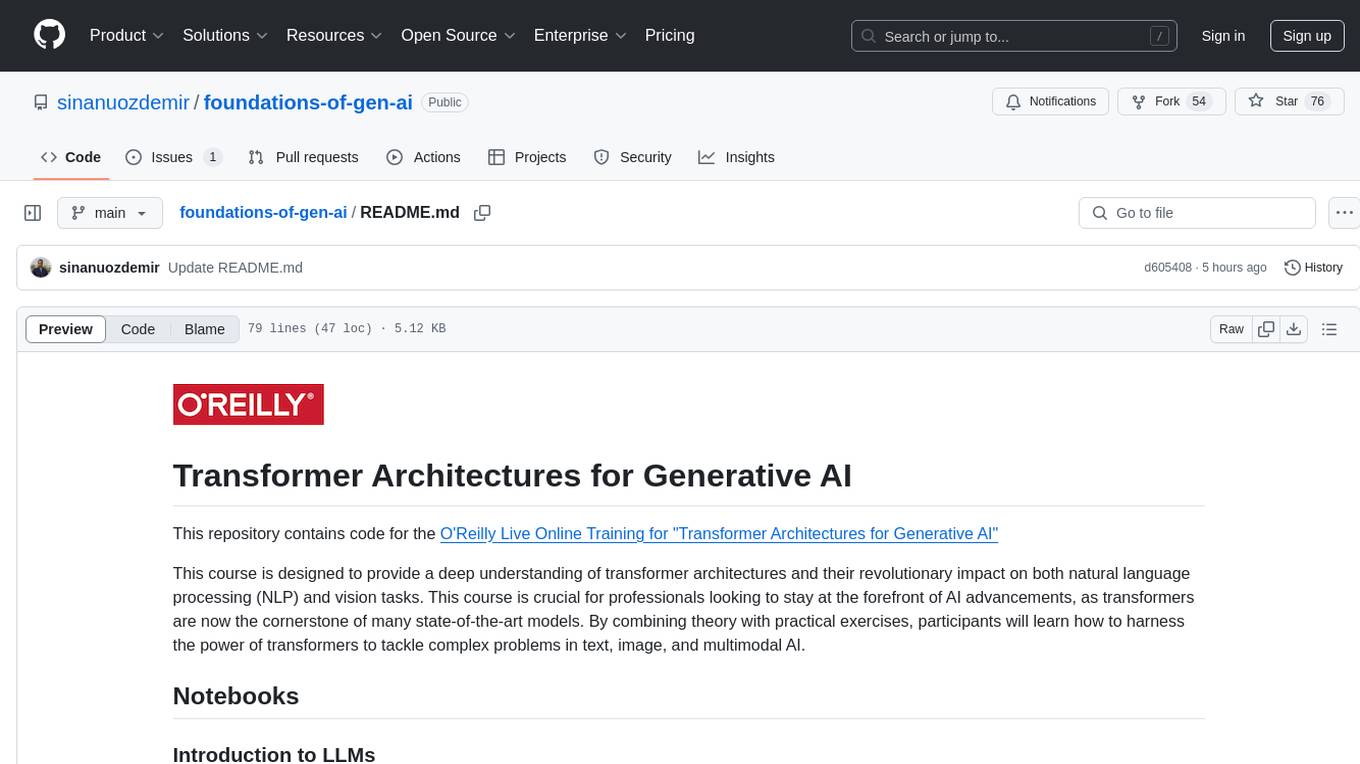
foundations-of-gen-ai
This repository contains code for the O'Reilly Live Online Training for 'Transformer Architectures for Generative AI'. The course provides a deep understanding of transformer architectures and their impact on natural language processing (NLP) and vision tasks. Participants learn to harness transformers to tackle problems in text, image, and multimodal AI through theory and practical exercises.
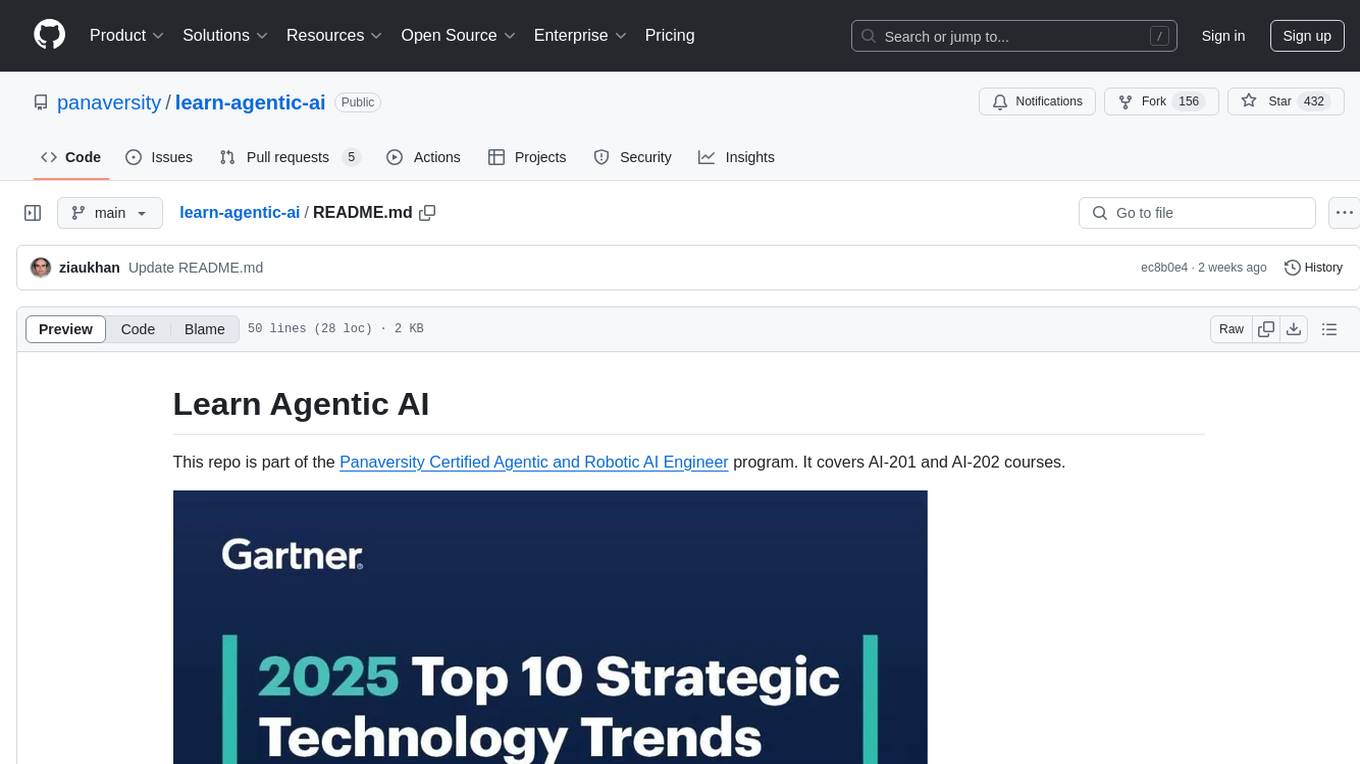
learn-agentic-ai
Learn Agentic AI is a repository that is part of the Panaversity Certified Agentic and Robotic AI Engineer program. It covers AI-201 and AI-202 courses, providing fundamentals and advanced knowledge in Agentic AI. The repository includes video playlists, projects, and project submission guidelines for students to enhance their understanding and skills in the field of AI engineering.
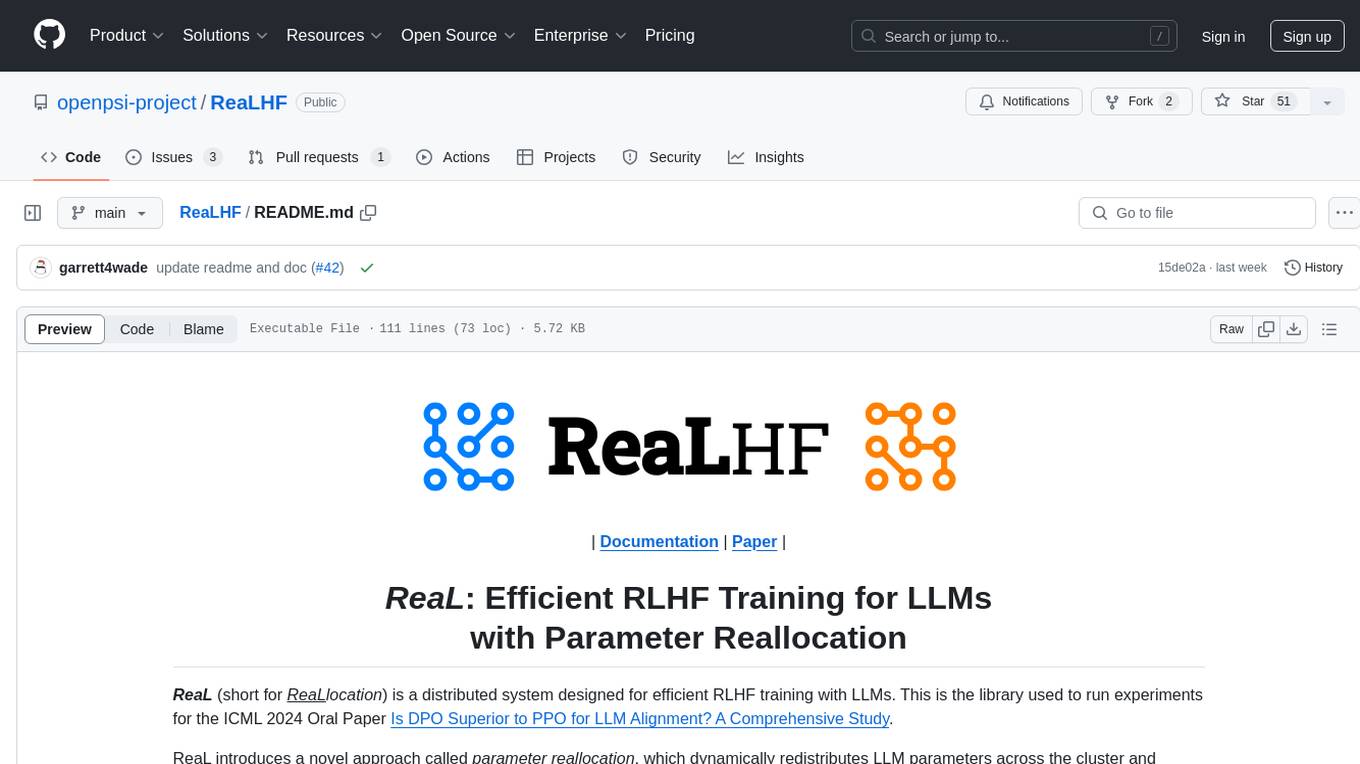
ReaLHF
ReaLHF is a distributed system designed for efficient RLHF training with Large Language Models (LLMs). It introduces a novel approach called parameter reallocation to dynamically redistribute LLM parameters across the cluster, optimizing allocations and parallelism for each computation workload. ReaL minimizes redundant communication while maximizing GPU utilization, achieving significantly higher Proximal Policy Optimization (PPO) training throughput compared to other systems. It supports large-scale training with various parallelism strategies and enables memory-efficient training with parameter and optimizer offloading. The system seamlessly integrates with HuggingFace checkpoints and inference frameworks, allowing for easy launching of local or distributed experiments. ReaLHF offers flexibility through versatile configuration customization and supports various RLHF algorithms, including DPO, PPO, RAFT, and more, while allowing the addition of custom algorithms for high efficiency.
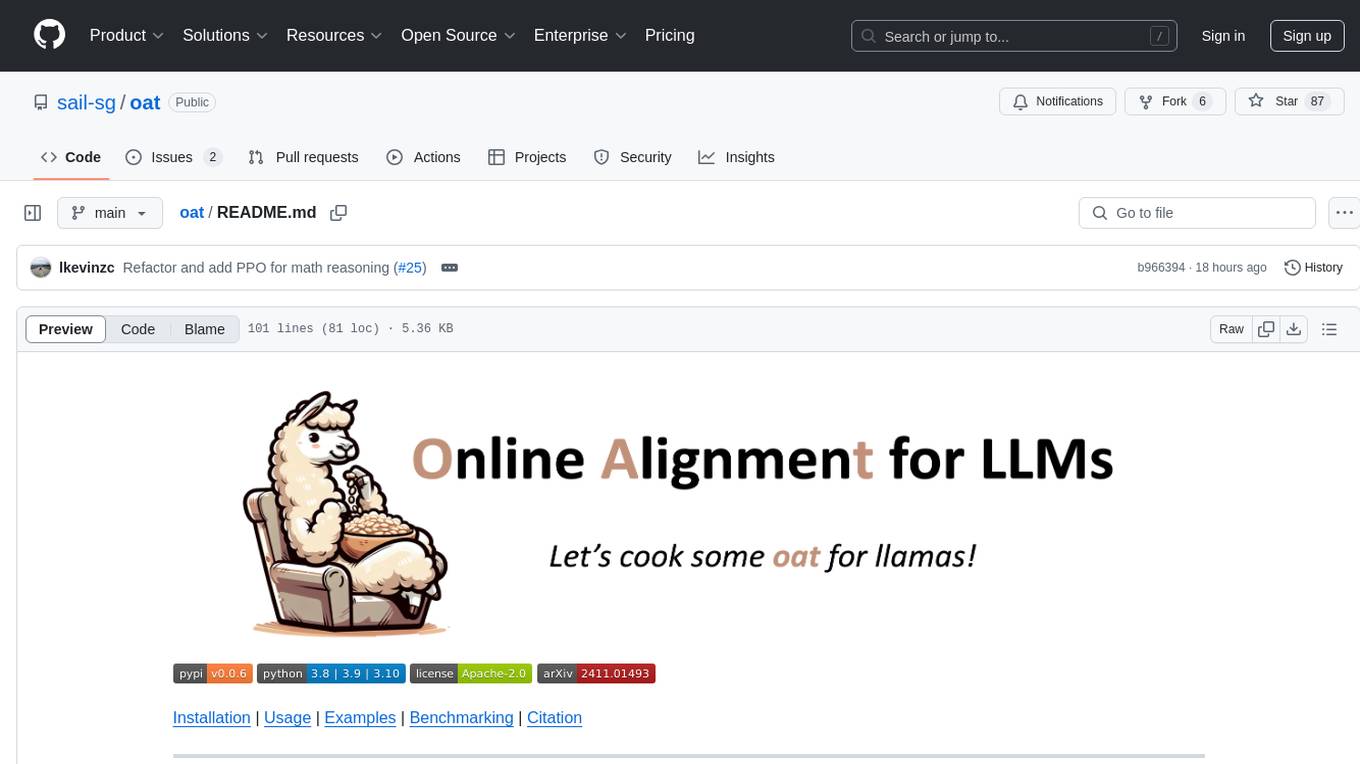
oat
Oat is a simple and efficient framework for running online LLM alignment algorithms. It implements a distributed Actor-Learner-Oracle architecture, with components optimized using state-of-the-art tools. Oat simplifies the experimental pipeline of LLM alignment by serving an Oracle online for preference data labeling and model evaluation. It provides a variety of oracles for simulating feedback and supports verifiable rewards. Oat's modular structure allows for easy inheritance and modification of classes, enabling rapid prototyping and experimentation with new algorithms. The framework implements cutting-edge online algorithms like PPO for math reasoning and various online exploration algorithms.
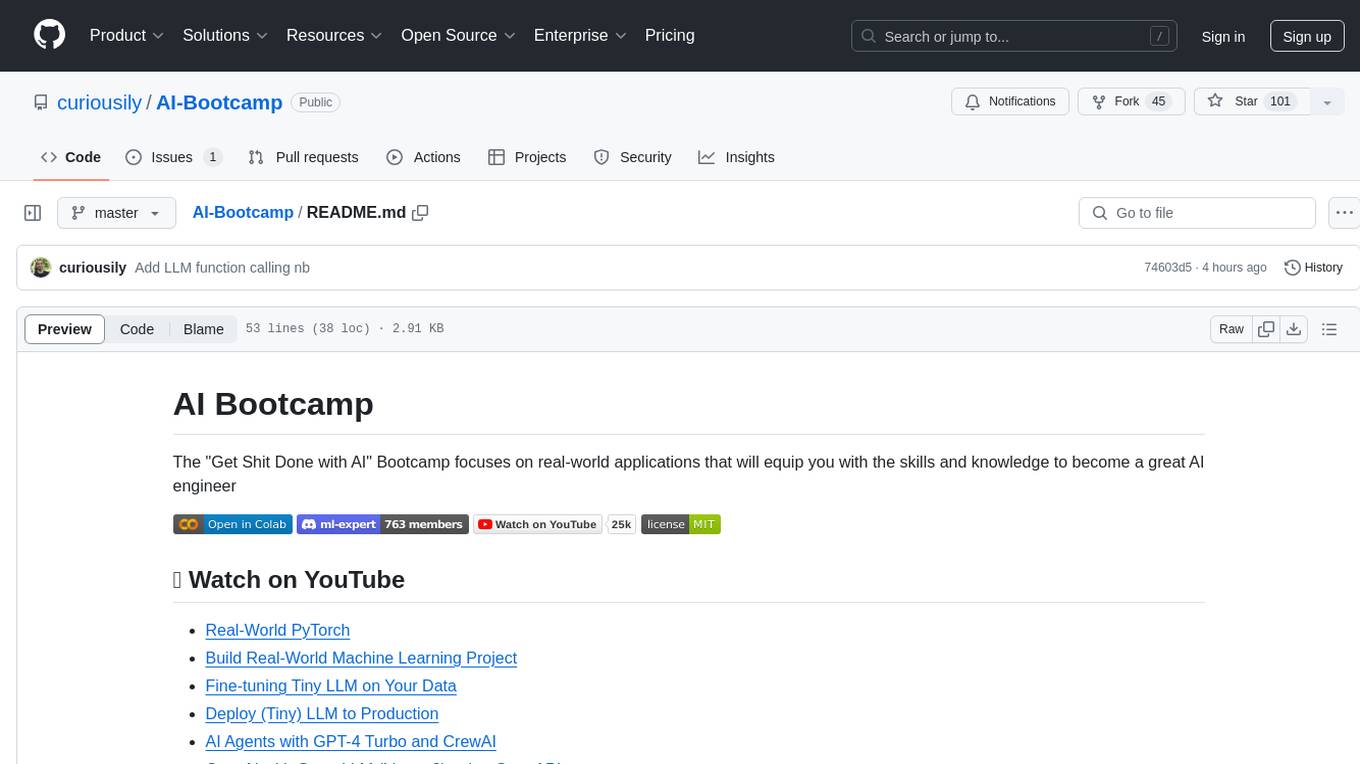
AI-Bootcamp
The AI Bootcamp is a comprehensive training program focusing on real-world applications to equip individuals with the skills and knowledge needed to excel as AI engineers. The bootcamp covers topics such as Real-World PyTorch, Machine Learning Projects, Fine-tuning Tiny LLM, Deployment of LLM to Production, AI Agents with GPT-4 Turbo, CrewAI, Llama 3, and more. Participants will learn foundational skills in Python for AI, ML Pipelines, Large Language Models (LLMs), AI Agents, and work on projects like RagBase for private document chat.
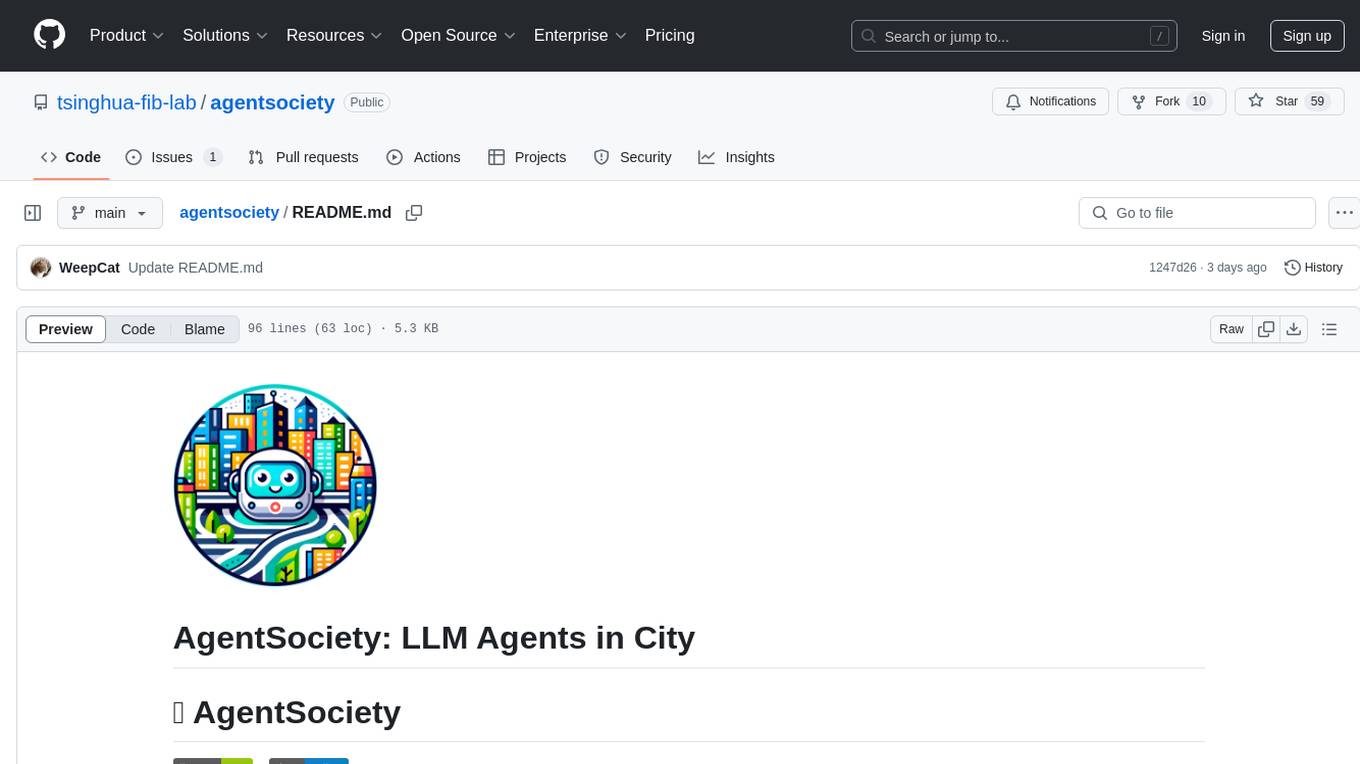
agentsociety
AgentSociety is an advanced framework designed for building agents in urban simulation environments. It integrates LLMs' planning, memory, and reasoning capabilities to generate realistic behaviors. The framework supports dataset-based, text-based, and rule-based environments with interactive visualization. It includes tools for interviews, surveys, interventions, and metric recording tailored for social experimentation.
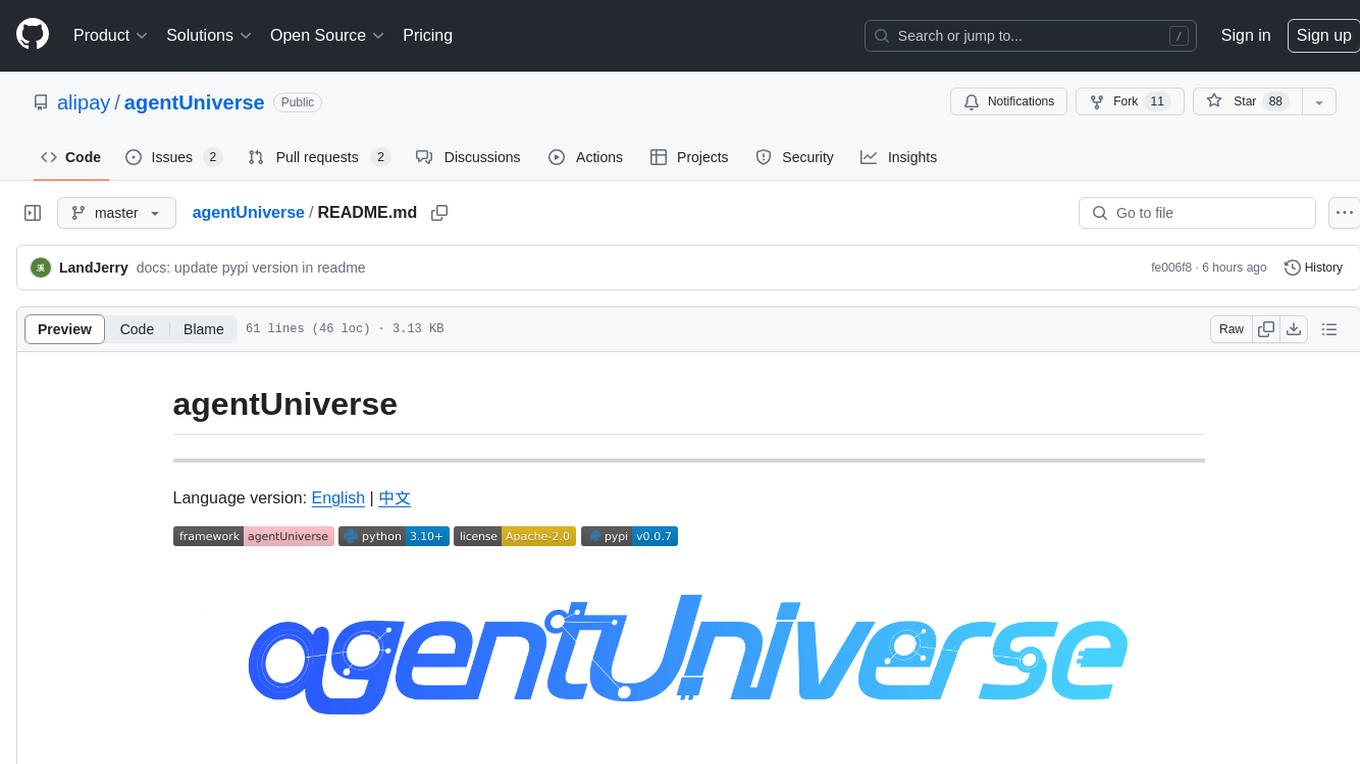
agentUniverse
agentUniverse is a framework for developing applications powered by multi-agent based on large language model. It provides essential components for building single agent and multi-agent collaboration mechanism for customizing collaboration patterns. Developers can easily construct multi-agent applications and share pattern practices from different fields. The framework includes pre-installed collaboration patterns like PEER and DOE for complex task breakdown and data-intensive tasks.
For similar tasks

awesome-ml-gen-ai-elixir
A curated list of Machine Learning (ML) and Generative AI (GenAI) packages and resources for the Elixir programming language. It includes core tools for data exploration, traditional machine learning algorithms, deep learning models, computer vision libraries, generative AI tools, livebooks for interactive notebooks, and various resources such as books, videos, and articles. The repository aims to provide a comprehensive overview for experienced Elixir developers and ML/AI practitioners exploring different ecosystems.
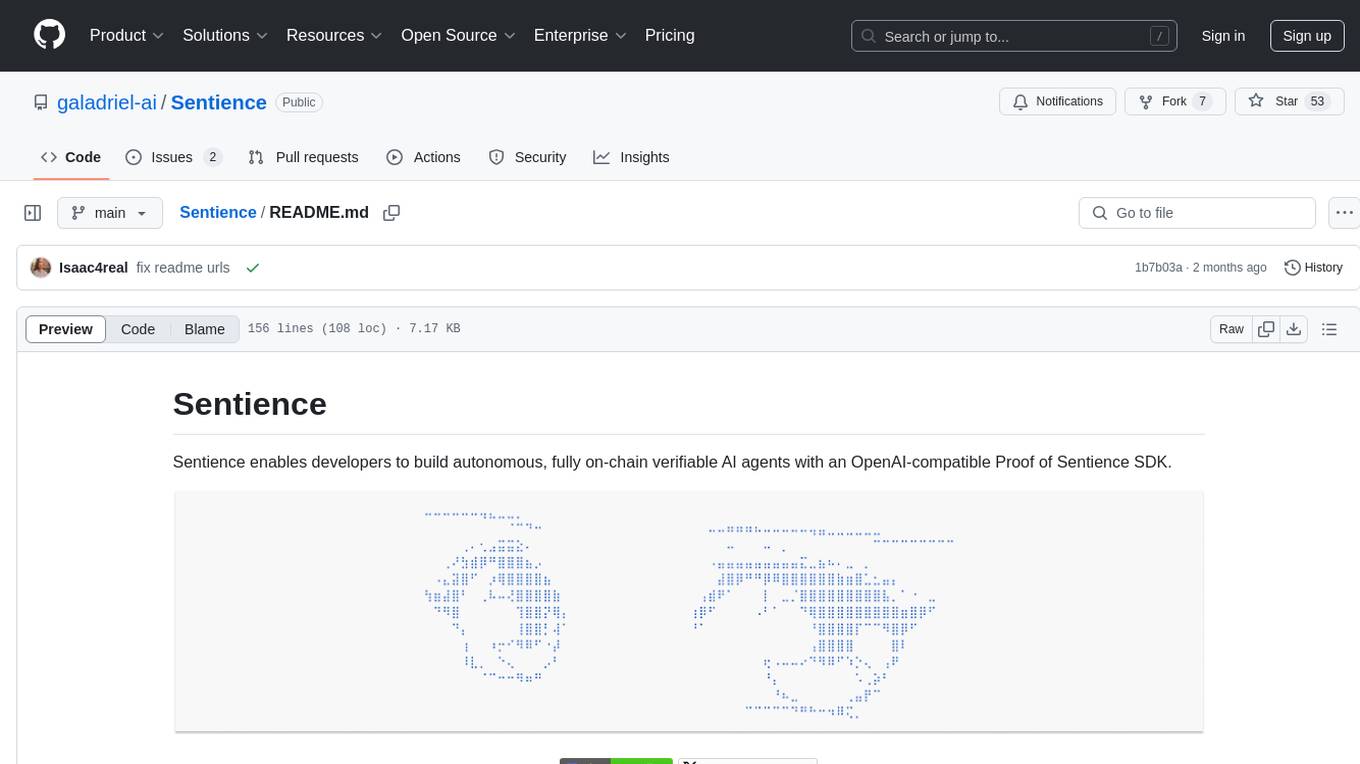
Sentience
Sentience is a tool that allows developers to create autonomous AI agents on-chain with verifiable proofs. It leverages a Trusted Execution Environment (TEE) architecture to ensure secure execution of AI calls and provides transparency through cryptographic attestations posted on Solana's blockchain. The tool enhances market potential by transforming agents into cryptographically verifiable entities, addressing the need for trust in AI development. Sentience offers features like OpenAI compatibility, on-chain verifiability, an explorer for agent history, and an easy-to-use developer experience. The repository includes SDKs for Python and JavaScript, along with components for verified inference and instructions for verifying the TEE architecture.

pandas-ai
PandasAI is a Python library that makes it easy to ask questions to your data in natural language. It helps you to explore, clean, and analyze your data using generative AI.
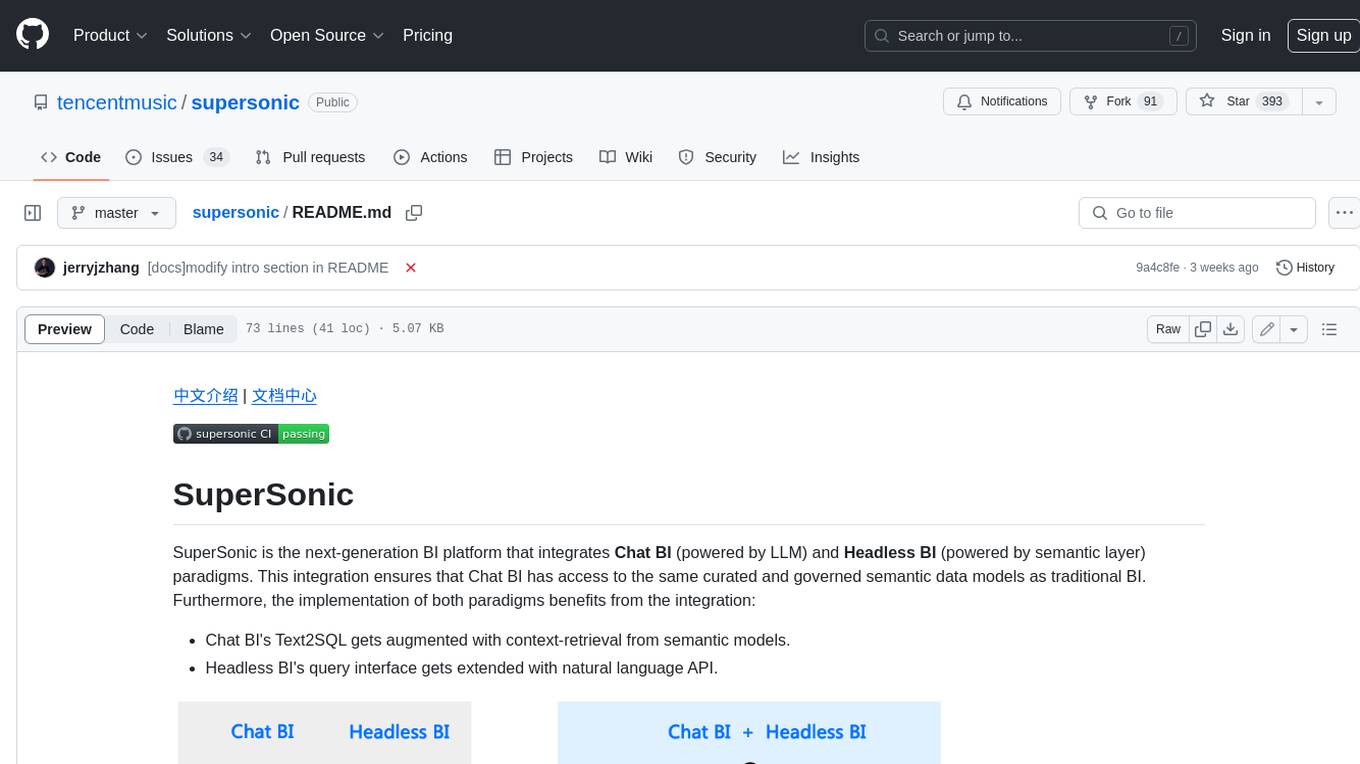
supersonic
SuperSonic is a next-generation BI platform that integrates Chat BI (powered by LLM) and Headless BI (powered by semantic layer) paradigms. This integration ensures that Chat BI has access to the same curated and governed semantic data models as traditional BI. Furthermore, the implementation of both paradigms benefits from the integration: * Chat BI's Text2SQL gets augmented with context-retrieval from semantic models. * Headless BI's query interface gets extended with natural language API. SuperSonic provides a Chat BI interface that empowers users to query data using natural language and visualize the results with suitable charts. To enable such experience, the only thing necessary is to build logical semantic models (definition of metric/dimension/tag, along with their meaning and relationships) through a Headless BI interface. Meanwhile, SuperSonic is designed to be extensible and composable, allowing custom implementations to be added and configured with Java SPI. The integration of Chat BI and Headless BI has the potential to enhance the Text2SQL generation in two dimensions: 1. Incorporate data semantics (such as business terms, column values, etc.) into the prompt, enabling LLM to better understand the semantics and reduce hallucination. 2. Offload the generation of advanced SQL syntax (such as join, formula, etc.) from LLM to the semantic layer to reduce complexity. With these ideas in mind, we develop SuperSonic as a practical reference implementation and use it to power our real-world products. Additionally, to facilitate further development we decide to open source SuperSonic as an extensible framework.
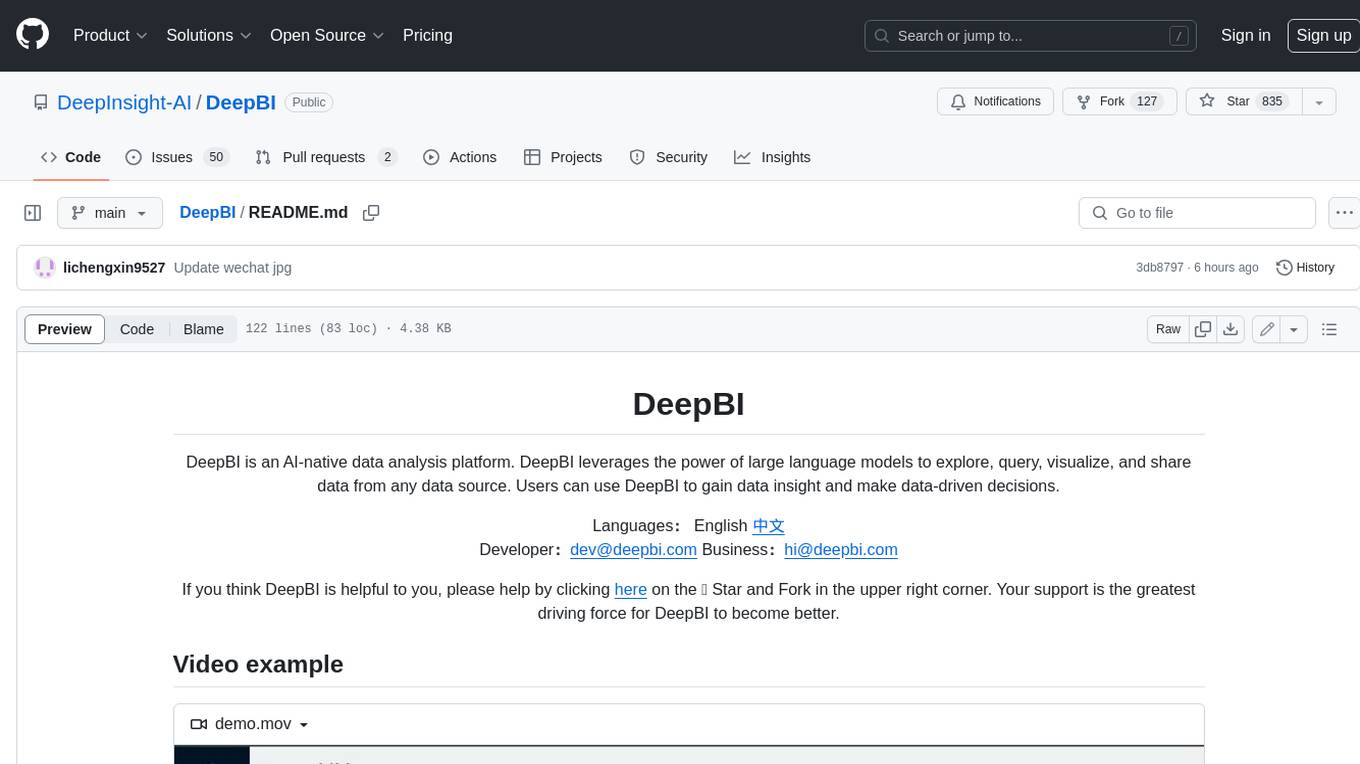
DeepBI
DeepBI is an AI-native data analysis platform that leverages the power of large language models to explore, query, visualize, and share data from any data source. Users can use DeepBI to gain data insight and make data-driven decisions.
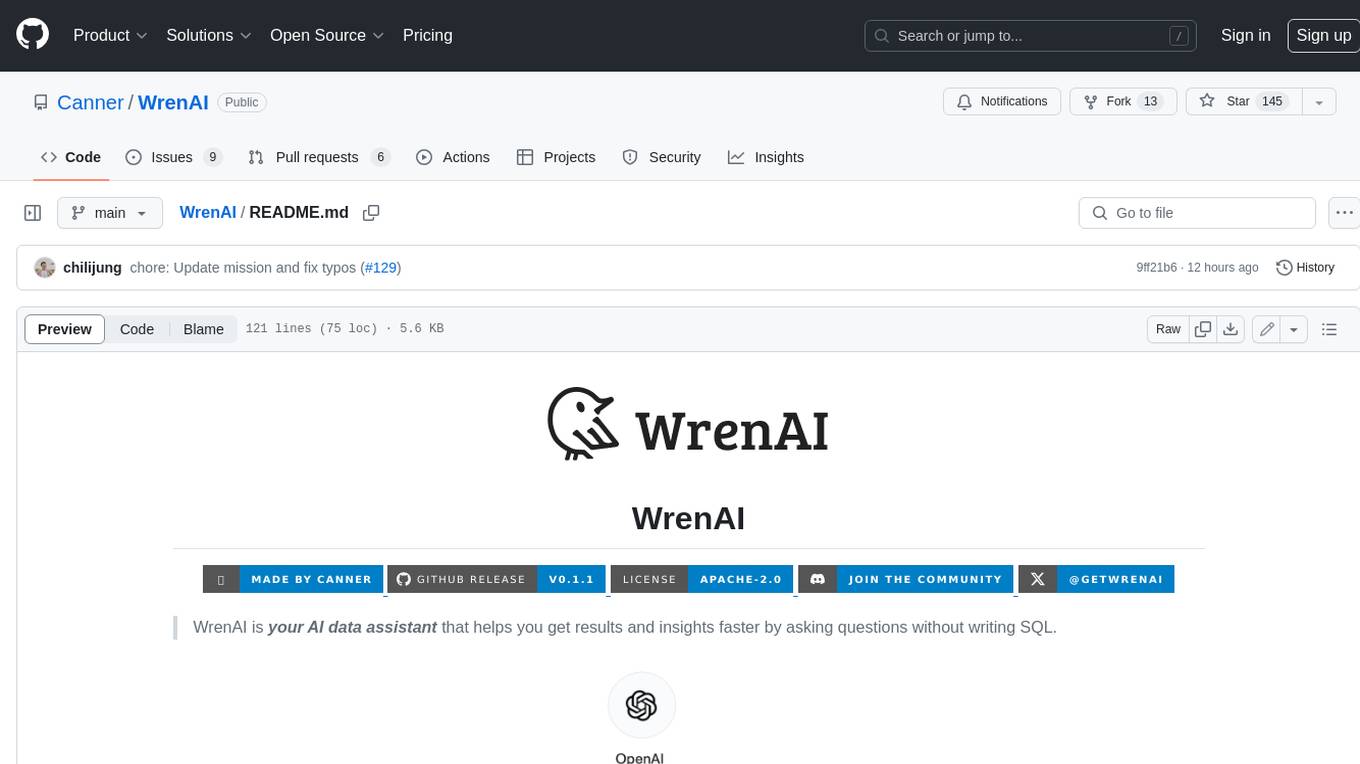
WrenAI
WrenAI is a data assistant tool that helps users get results and insights faster by asking questions in natural language, without writing SQL. It leverages Large Language Models (LLM) with Retrieval-Augmented Generation (RAG) technology to enhance comprehension of internal data. Key benefits include fast onboarding, secure design, and open-source availability. WrenAI consists of three core services: Wren UI (intuitive user interface), Wren AI Service (processes queries using a vector database), and Wren Engine (platform backbone). It is currently in alpha version, with new releases planned biweekly.
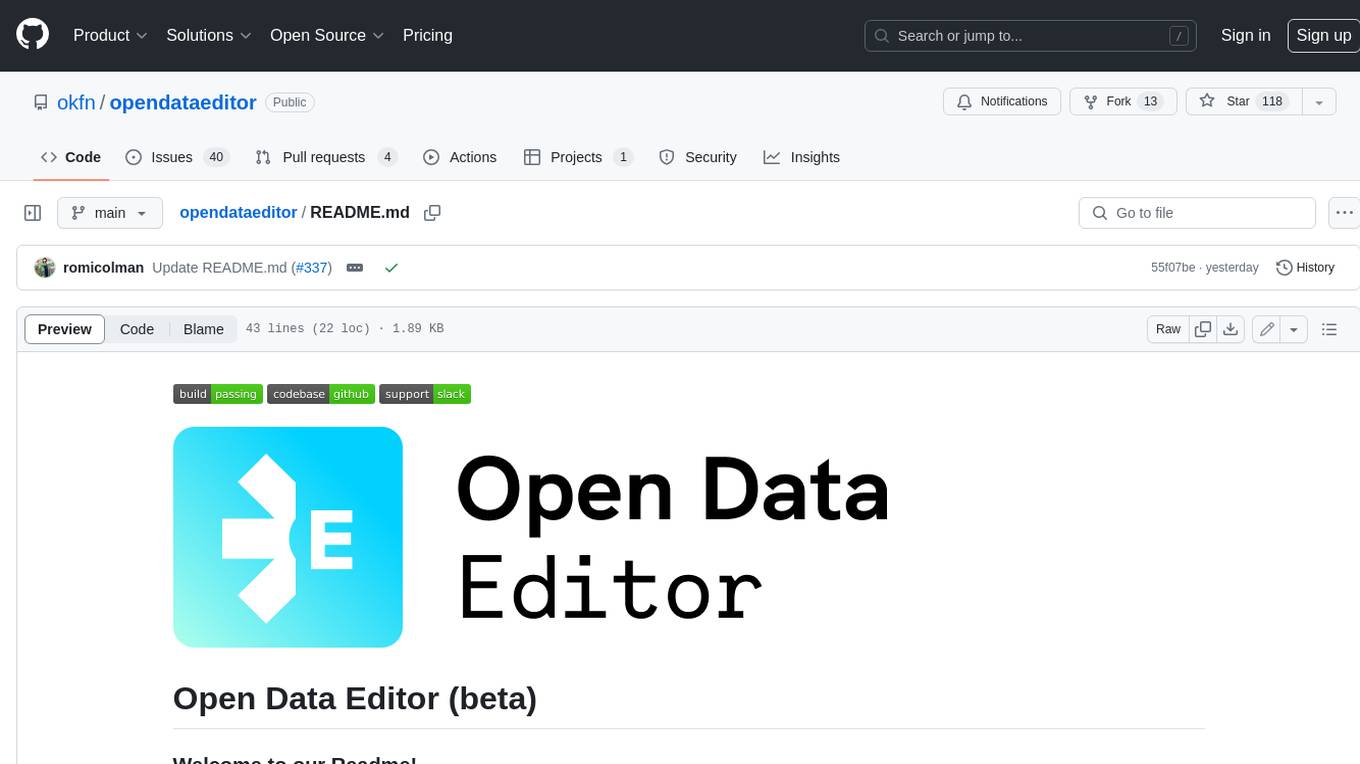
opendataeditor
The Open Data Editor (ODE) is a no-code application to explore, validate and publish data in a simple way. It is an open source project powered by the Frictionless Framework. The ODE is currently available for download and testing in beta.
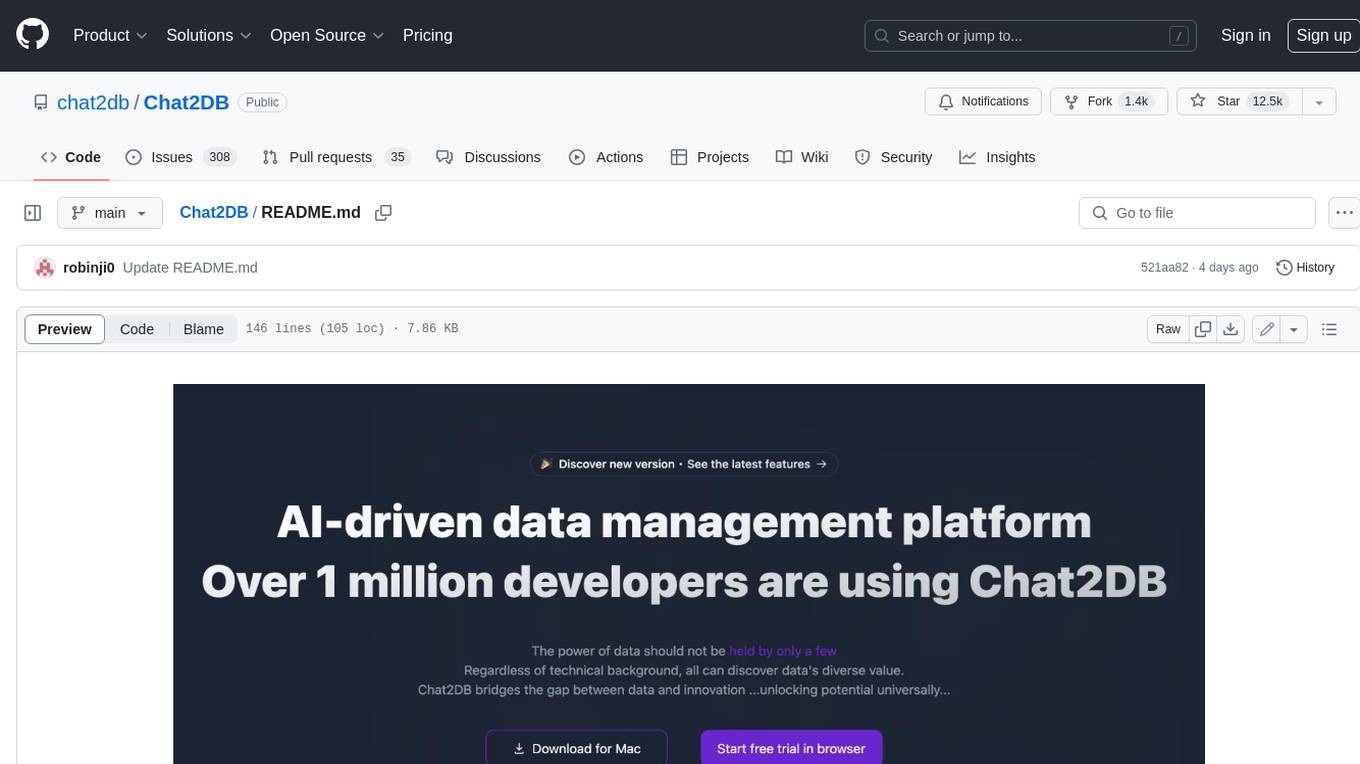
Chat2DB
Chat2DB is an AI-driven data development and analysis platform that enables users to communicate with databases using natural language. It supports a wide range of databases, including MySQL, PostgreSQL, Oracle, SQLServer, SQLite, MariaDB, ClickHouse, DM, Presto, DB2, OceanBase, Hive, KingBase, MongoDB, Redis, and Snowflake. Chat2DB provides a user-friendly interface that allows users to query databases, generate reports, and explore data using natural language commands. It also offers a variety of features to help users improve their productivity, such as auto-completion, syntax highlighting, and error checking.
For similar jobs

weave
Weave is a toolkit for developing Generative AI applications, built by Weights & Biases. With Weave, you can log and debug language model inputs, outputs, and traces; build rigorous, apples-to-apples evaluations for language model use cases; and organize all the information generated across the LLM workflow, from experimentation to evaluations to production. Weave aims to bring rigor, best-practices, and composability to the inherently experimental process of developing Generative AI software, without introducing cognitive overhead.

LLMStack
LLMStack is a no-code platform for building generative AI agents, workflows, and chatbots. It allows users to connect their own data, internal tools, and GPT-powered models without any coding experience. LLMStack can be deployed to the cloud or on-premise and can be accessed via HTTP API or triggered from Slack or Discord.

VisionCraft
The VisionCraft API is a free API for using over 100 different AI models. From images to sound.

kaito
Kaito is an operator that automates the AI/ML inference model deployment in a Kubernetes cluster. It manages large model files using container images, avoids tuning deployment parameters to fit GPU hardware by providing preset configurations, auto-provisions GPU nodes based on model requirements, and hosts large model images in the public Microsoft Container Registry (MCR) if the license allows. Using Kaito, the workflow of onboarding large AI inference models in Kubernetes is largely simplified.

PyRIT
PyRIT is an open access automation framework designed to empower security professionals and ML engineers to red team foundation models and their applications. It automates AI Red Teaming tasks to allow operators to focus on more complicated and time-consuming tasks and can also identify security harms such as misuse (e.g., malware generation, jailbreaking), and privacy harms (e.g., identity theft). The goal is to allow researchers to have a baseline of how well their model and entire inference pipeline is doing against different harm categories and to be able to compare that baseline to future iterations of their model. This allows them to have empirical data on how well their model is doing today, and detect any degradation of performance based on future improvements.

tabby
Tabby is a self-hosted AI coding assistant, offering an open-source and on-premises alternative to GitHub Copilot. It boasts several key features: * Self-contained, with no need for a DBMS or cloud service. * OpenAPI interface, easy to integrate with existing infrastructure (e.g Cloud IDE). * Supports consumer-grade GPUs.

spear
SPEAR (Simulator for Photorealistic Embodied AI Research) is a powerful tool for training embodied agents. It features 300 unique virtual indoor environments with 2,566 unique rooms and 17,234 unique objects that can be manipulated individually. Each environment is designed by a professional artist and features detailed geometry, photorealistic materials, and a unique floor plan and object layout. SPEAR is implemented as Unreal Engine assets and provides an OpenAI Gym interface for interacting with the environments via Python.

Magick
Magick is a groundbreaking visual AIDE (Artificial Intelligence Development Environment) for no-code data pipelines and multimodal agents. Magick can connect to other services and comes with nodes and templates well-suited for intelligent agents, chatbots, complex reasoning systems and realistic characters.